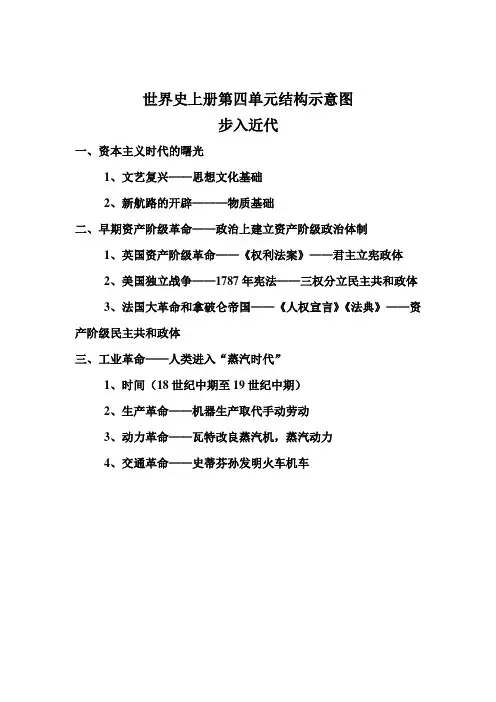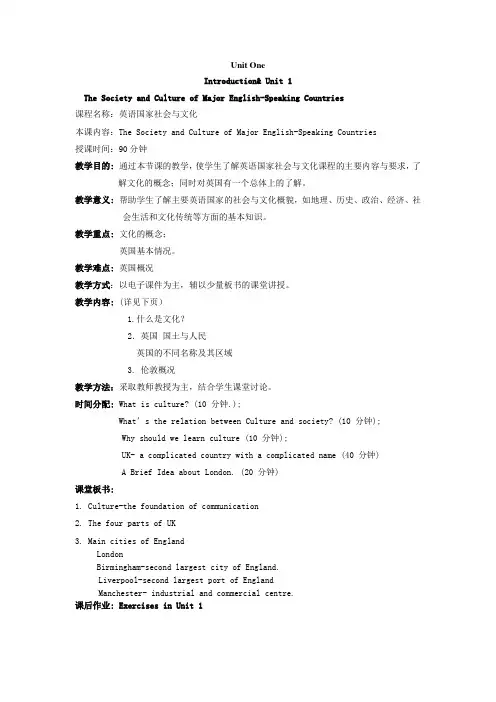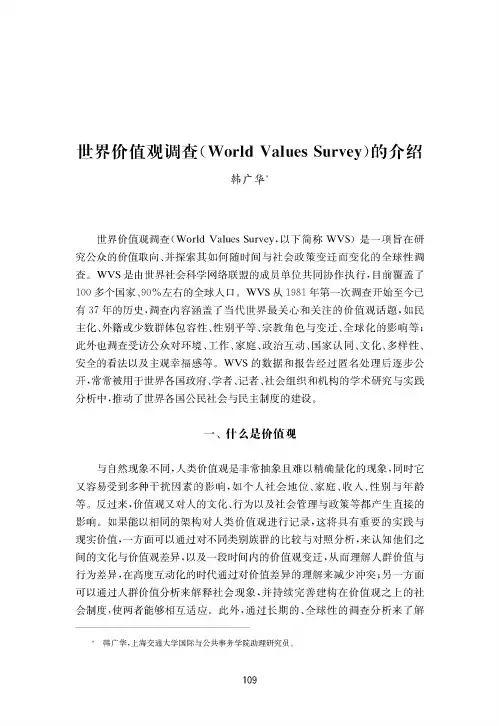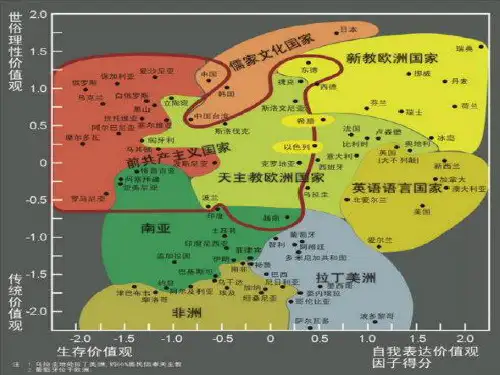英格尔哈特的世界政治文化地图
- 格式:ppt
- 大小:116.00 KB
- 文档页数:3

世界史上册第四单元结构示意图
步入近代
一、资本主义时代的曙光
1、文艺复兴——思想文化基础
2、新航路的开辟———物质基础
二、早期资产阶级革命——政治上建立资产阶级政治体制
1、英国资产阶级革命——《权利法案》——君主立宪政体
2、美国独立战争——1787年宪法——三权分立民主共和政体
3、法国大革命和拿破仑帝国——《人权宣言》《法典》——资产阶级民主共和政体
三、工业革命——人类进入“蒸汽时代”
1、时间(18世纪中期至19世纪中期)
2、生产革命——机器生产取代手动劳动
3、动力革命——瓦特改良蒸汽机,蒸汽动力
4、交通革命——史蒂芬孙发明火车机车。


Unit OneIntroduction& Unit 1The Society and Culture of Major English-Speaking Countries课程名称:英语国家社会与文化本课内容:The Society and Culture of Major English-Speaking Countries授课时间:90分钟教学目的:通过本节课的教学,使学生了解英语国家社会与文化课程的主要内容与要求,了解文化的概念;同时对英国有一个总体上的了解。
教学意义:帮助学生了解主要英语国家的社会与文化概貌,如地理、历史、政治、经济、社会生活和文化传统等方面的基本知识。
教学重点:文化的概念;英国基本情况。
教学难点:英国概况教学方式:以电子课件为主,辅以少量板书的课堂讲授。
教学内容: (详见下页)1.什么是文化?2.英国国土与人民英国的不同名称及其区域3. 伦敦概况教学方法:采取教师教授为主,结合学生课堂讨论。
时间分配: What is culture? (10 分钟.);What’s th e relation between Culture and society? (10 分钟);Why should we learn culture (10 分钟);UK- a complicated country with a complicated name(40 分钟)A Brief Idea about London. (20 分钟)课堂板书:1. Culture-the foundation of communication2. The four parts of UK3. Main cities of EnglandLondonBirmingham-second largest city of England.Liverpool-second largest port of EnglandManchester- industrial and commercial centre.课后作业: Exercises in Unit 1Unit OnePart One1.What is culture?Culture-the foundation of communicationCulture is very abstract and complicated. Concretely speaking, it refers to all the aspects of social life, such as, the values, the practices of a society and social conventions, education, politics, art or literature,language,ideas,etc.文化即是人们所思,所言(言语和非言语),所为,所觉的总和.文化是无处不在的,具体说来,包括社会生活的一切方面,如:价值观念,生活行为方式,社会规范等,乃至艺术,政治,经济, 教育,修养,文学,语言,思想等.2. What’s the relation between Culture and society?1)Culture is a separate idea from society, although culture and society areinterrelated and cannot exist without each other.2)Culture is a system of values (or beliefs) and norms (or behaviour). A societyis a system of interrelationships which connect or bind individuals together.3. Why should we learn culture?1)Requirement of communication2) Language and culture are inseparable3)Culture acquisition is important for the study of literature.Part TwoUK- a complicated country with a complicated nameⅠStatus in the worldEffects of its Imperial Past--“an empire in which the sun never set”(日不落帝国):1.one of five permanent members of the UN Security Council, a founding memberof NATO, and of the Commonwealth,2. Member of European Union and the Group of seven3.The make-up of the British population (Immigration has produced a populationof which 1 in 20 are of non-European ethnicity.)II. The effects of its imperial past* The days of empire ended after World War II1. The effects were mainly encountered in the close relationships which exist with the 50 or more colonies of that empire, and which maintain links through Commonwealth of Nations. But more important international relation is its membership in the European Union since 1973.2. The makeup of the British population--- immigration from India, Pakistan, or Caribbean (西印度群岛与中南美洲海域) countries in the 1950s and1960s. 1/20 are non-European ethnicity.III.The features of British society:1.a multiracial societyRacial, gender, class, regional and economic differences in the societya multi-racial society: most are Christians and because of immigration, many are Muslims;gender difference: male and female live different livesclass difference: the class structure of UK society is relatively obvious (A white-collar worker’s lives are very different from a blue-collar worker’s.) economic and regional difference within each of the 4 countries:-- difference between highland and lowland Scots-- difference between north and south England (South is on average more wealthy than the north)2. a society with class-structure3. a society with difference of region difference: highland and lowland Scots,north and south England,the capital and provinces.Part ThreeMain cities of England1. London2. Birmingham-second largest city of England.3. Liverpool-second largest port of England4. Manchester- industrial and commercial centre.London--cultural,bussness,and financial centre1. One of the most famous cities of the world, London is England's capital and a favourite for tourists from all over the world who flock there in their millions. It has a history stretching back almost 2000 years, A population of 7.5 million people, and some of the most famous tourist attractions in the world.2.London Attractions:Big Ben and the Houses of Parliament.The Tower of London,Tower Bridge,St Paul's Cathedralthe River ThamesCountless fascinating museums, art galleries and famous theatres.The English Royal Family reside in London at Buckingham Palacewhere you can see the famous 'Changing of the Guard'and muchmore.3. A significant role of LondonWhen a man is tired of London, you are tired of life for there is in London all that life can afford.—Samuel Johnson London is dominant in UK in all sorts of ways.1)It is the largest city in the country with abo ut one seventh of the nation’spopulation.2)It is seat of government.3)It is the cultural centre.4)It is the business centre.5)It is the financial centre of the nation.6)London is a huge weight in Britain’s economic and cultural life, and to someextent the rest of the country lives in its shadow.For reference英国历代国王与王后Geographical features1.Geographical positionThe United Kingdom of Great Britain and Northern Ireland (UK) is situated north-west of the European continent between the Atlantic Ocean and the North Sea. It has a total land area of 244,100 square kilometres, of which nearly 99% is land and the remainder inland water. From north to south it is about 1,000 kilometres long.(1) Northwest of Europe(2) North Atlantic Ocean(3) Separated from the rest of Europe by the English Channel2.Geographical features(1) An island country, surrounded by sea(2) Highlands in the north and west(3) Lowlands in the east and southeastA. Part of the great European PlainB. Level land and fertile soilC. farming(4) 3 natural zones in ScotlandA. the highlands in the northB. the central lowlandsC. the southern uplands. Rivers and LakesImportant role of rivers in the country’s economy1.Important Rivers(1)the Severn RiverA.the longest in the countryB.only 338 kilos long(2)the Thames RiverA.the 2nd longestB.the most important riverC.336 kilos longD.Oxford and London are on the river(3)River ClydeA.the most important in ScotlandB.important commercial waterway2.the Lake District(1)in northwest England and North Wales(2)popular tourist attractions(3)the home of the Lake PoetsA.William WordsworthB.Samuel Taylor ColeridgeC.Robert SoutheyClimate1.Typical feature of Britain’s climate“Other countries have a climate; in England we have weather.”The statement is often made by Englishmen to describe the peculiar meteorological conditions of their country.A maritime type of climate(1)rainy---abundant rainfallThe uncertainty about the weather tends to make the Englishmen cautious.“A foreigner may laugh when he sees the Englishman setting forth on a brilliantly sunny morning wearing a raincoat and carrying an umbrella, but he may well regret his laughter later in the day!”(2)changeable and unpredictable, no clear cut of 4 seasons“In no country other than England, it has been said, can one experience four seasons in the course of a single day! Day may break as a balmy spring morning; an hour or so later black clouds may have appeared from nowhere and the rain may be pouring down. At midday conditions may be really wintry with the temperature down by about eight degrees or more centigrade. And then, in the late afternoon the sky will clear, the sun will begin to shine, and for an hour or two before darkness falls, it will be summer.”(3)Mild: no extremesIn England one can experience almost every kind of weather except the most extreme.temperature: 4-6℃ in winter, 12-17℃ in summer2.Factors influencing the climate(1)the surrounding waters(2)the prevailing south-west winds(3)the North Atlantic Drift (warm current)3.Rainfall(1) a steady reliable rainfall throughout the year(2)uneven distribution of rainA. a water surplus in the north and westB. a water deficit in the south and eastUnit TwoThe History of England课程名称:英语国家社会与文化本课内容:The Society and Culture of Major English-Speaking Countries授课时间:90分钟教学目的:通过本节课的教学,使学生了解英国历史,尤其是英格兰的历史;掌握主要历史事件及人物。



世界价值观调查(World Values Survey)的介绍韩广华#世界价值观调查(World Values Survey,以下简称WVS)是一项旨在研究公众的价值取向、并探索其如何随时间与社会政策变迁而变化的全球性调查。
WVS是由世界社会科学网络联盟的成员单位共同协作执行,目前覆盖了100多个国家、90%左右的全球人口。
WVS从1981年第一次调查开始至今已有37年的历史,调查内容涵盖了当代世界最关心和关注的价值观话题,如民主化、外籍或少数群体包容性、性别平等、宗教角色与变迁、全球化的影响等;此外也调查受访公众对环境、工作、家庭、政治互动、国家认同、文化、多样性、安全的看法以及主观幸福感等。
WVS的数据和报告经过匿名处理后逐步公开,常常被用于世界各国政府、学者、记者、社会组织和机构的学术研究与实践分析中,推动了世界各国公民社会与民主制度的建设。
一、什么是价值观与自然现象不同,人类价值观是非常抽象且难以精确量化的现象,同时它又容易受到多种干扰因素的影响,如个人社会地位、家庭、收入、性别与年龄等。
反过来,价值观又对人的文化、行为以及社会管理与政策等都产生直接的影响。
如果能以相同的架构对人类价值观进行记录,这将具有重要的实践与现实价值,一方面可以通过对不同类别族群的比较与对照分析,来认知他们之间的文化与价值观差异,以及一段时间内的价值观变迁,从而理解人群价值与行为差异,在高度互动化的时代通过对价值差异的理解来减少冲突;另一方面可以通过人群价值分析来解释社会现象,并持续完善建构在价值观之上的社会制度,使两者能够相互适应。
此外,通过长期的、全球性的调查分析来了解韩广华,上海交通大学国际与公共事务学院助理研究员实证社会科学(第四卷)与追踪弱势价值观,从而保持价值与文化的多样性。
自从20世纪中期开始,学者就开始尝试对人类价值观进行相对精确系统的归纳,对人类价值观形成了较为具体的基本判断,例如Kluckhohn等学者认为价值观是与情感紧密相连的信仰,或者可被解释为与人类人生目标相关的激励方式;同样,价值观超越了特定的事务与行为,是一种在人们的经济、种族与政治等行为中做出指引的标准(Kluckhohn,1951;Morris,1956;Feather,1995)。

